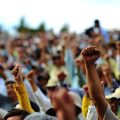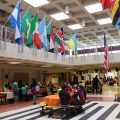
Growing up in Fort Morgan, I always admired the diversity of our small community and how welcoming I thought we were of people of different races and ethnicities. But as the years passed by, I began to see situations and systems in our town with a different perspective. When I canvassed for the 2008 presidential campaign, I saw how Black, Indigenous, and other people of color--especially immigrant families--are viewed in my community. Rather than let this realization discourage me, I used it as motivation. I fell in love with the power of community organizing and the effect and change it could have in our small community.
Community organizing has helped me connect people to information and resources that can benefit them and their families, and ultimately take action for systems change. This is both upstream and downstream work, and both are important. “Downstream” means direct service support for those in immediate need, whereas “upstream” change solves deeper problems and requires long term strategy, with bigger societal benefits.
At the beginning of this pandemic, Center for Health Progress and our community organizers decided that in order to better meet our communities’ needs, our work needed to shift. We launched a phone tree strategy where organizers would reach out to our local grassroots leaders and check in on them to see how they were doing. The phone tree then expanded to the Morgan Health Connectors and other grassroots leaders reaching out to other immigrants in their communities checking in to make sure they were okay physically, mentally, and financially. We have also been hosting workshops about Pandemic-EBT, which is distributing the funds that would’ve been spent on free and reduced school lunch if schools hadn’t been closed this spring. We’re helping families apply for this resource and ensure their children are fed. In addition, we have been providing virtual training on Emergency Medicaid, and Workers Rights.
It was evident that our upstream work had to be placed on hold because the immediate needs of our communities were all downstream during this hard time. Staying in touch through the phone tree with the immigrant community was and continues to be crucial during these unprecedented times, so we continue to push to build relationships and trust in Fort Morgan and Pueblo.
Our check-ins with our immigrant community members will continue to be our priority as long as this pandemic is around, because the truth of the matter is COVID hurts our immigrant communities more than any other. Good health is more than health care. The majority of essential workers don’t have the privilege to work from or stay home; they have to continue work on the front lines during this pandemic to provide for their families--which is also keeping our economy afloat. These phone tree calls have helped us collect stories that shine a light on the harsh realities immigrants face on a day-to-day basis, like the fact that they can’t take paid sick time to take care of themselves or a sick family member, or how dire the need is for financial assistance and food. Their stories have helped us pass state-level policies that are helping hundreds of thousands of families.
This November 10, we’ll be premiering a short documentary film where you can meet some of your fellow Coloradans whose lives have been upended by the pandemic. I hope you’ll tune in to listen to their stories and then take action to fight for more just systems that will benefit all of us!




